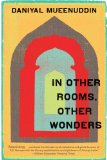Summary | Excerpt | Reading Guide | Reviews | Beyond the Book | Readalikes | Genres & Themes | Author Bio

She squatted in the dark, pulling down her shalvar and trying to pee. Nothing came. His voice had been gentle. Three bars of light filtered across the air above her head, alive with motes of dust, and this filled her with hope. The summer would be here in a month, the cold winter had passed. She loved the heat, thick night air, and the smell of water and dust, the cool shower spraying her breasts, water splashing on the furry walls in the dank room; and her body, coming out into the evening, drying her hair, head sideways, ear to her shoulder, combing its hanging length.
Rafik sat in the servants’ courtyard on one of the dirty white metal chairs, smoking a hookah, not looking at her as she sat down on a low wooden stool, almost at his knees.
He cupped the mouthpiece of the hookah with blunt weathered hands, a heavy agate ring on his index finger. She had never before looked closely at Rafik. He wore clean plain clothes, a woolen mountain vest—spoke with the curling phlegmy accent of the Salt Range, despite having served in Lahore for fifty years. Black shoes cracked where the toes bent, polished. He said the five daily prayers, the only servant who did. A week earlier he had dyed his hair red with henna, to keep him cool as summer came. Hair parted in the middle, looking almost martial but without any swagger; a small brush of mustache, thick ears of an aging man. He must be sixty, came into service as a boy, fifty years ago. He spent more time with the master than anyone else, woke the old man and put him to bed, brought him tea, massaged his feet, dressed him, brought him a single whiskey at night. All of Old Lahore knew Rafik, the barons, the landlords and magnates and politicians, the old dragons, the hostesses of forty years ago.
She let herself cry a few more tears—she could cry whenever she wanted, she thought of herself, alone, her husband on drugs, that dried-up stick who picked her out of the village, when she thought he was saving her. She was still a girl, not just then, but now too. She cried harder, wiping her eyes with the corner of her dupatta.
Rafik’s mouth worked, distorting his patient resigned face. He took a long pull on the hookah, the tobacco thick in the air.
They were alone, they could hear Hassan in the kitchen making lunch, pounding something. The drivers sat in their quarters playing cards, the gardeners tended their plants, the sweepers were in the house washing the toilets or the floors, or sweeping the leaves from the long tree-shaded drive at the front of the house.
“I know what you all think,” she began. “You think I’m a slut, you think I poison my husband. Because of him I’m alone, and you all do with me as you like. I’m trying to live here too, you know. I’m not a fool. I also come from somewhere.” Her words poured out clearly, evenly, angrily, entirely unplanned.
He didn’t say anything, smoked, his heavy-lidded eyes half shut.
After a moment she got up to leave.
“Stay a minute, girl. I’ll bring you tea.”
He shifted to get up, putting aside the bamboo stem of the hookah.
“All right, Uncle. But let me bring it.” His offering this meant so much to her.
Going boldly into the kitchen, she ladled tea into two chipped cups—the servants’ crockery—from a kettle that simmered on a back burner morning till night. Hassan ignored her.
She brought the cups and handed one to Rafik, hoping as she sat down on a bench that someone would come and see them together.
Touching the hot tea to her lips, she peered at him.
He poured tea into the saucer and blew the clotted cream away, then sipped. “It’s good, isn’t it?” he said.
She wanted to stop it, because it seemed too soon after her tears, but a smile came over her, rising up. She beamed, her girlish yet knowing face lit and transformed.
Excerpted from In Other Rooms, Other Wonders by Daniyal Mueenuddin. © 2009 by Daniyal Mueenuddin. Excerpted by permission of W.W.Norton & Company. All rights reserved. No part of this excerpt may be reproduced or reprinted without permission in writing from the publisher.
Don't join the book burners. Don't think you are going to conceal faults by concealing evidence that they ever ...
Click Here to find out who said this, as well as discovering other famous literary quotes!
Your guide toexceptional books
BookBrowse seeks out and recommends the best in contemporary fiction and nonfiction—books that not only engage and entertain but also deepen our understanding of ourselves and the world around us.